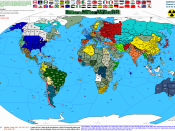Society has historically sought control over the natural world. This recurring tendency to pursue science and technology, and through control, to skew and redefine the notion of humanity is evidenced in both Brave New World and Blade Runner, each reflecting the context of their time of production yet dealing with essentially the same themes of science and technology dominating nature, and the dehumanization of society through excessive control.
Science and technology has often been man's means of subverting the natural world. The birth of the production line, developments in medicine, and the improved mediums of technological entertainment set Huxley in a quickly developing scientific context. Huxley's Brave New World examines the implications of man's pursuit of science and mass production at the expense of the natural world. Reflective of experiments in conditioning occurring during the 1920s, hypnopaedic conditioning reflects society's desire to move away from nature "a love of nature keeps no factories busy" and achieve control of the population through scientifically promoted consumerism "But old clothes are beastly.
We always throw away old clothes." Mass production is satirized through the production of humanity itself, and society's reliance on "podsnap technique" and "Bokanovsky's process". Meanwhile, advances in medical research are reflected through the ageless population of the world state, offsetting the natural process of aging. Science also controls natural negative emotions through the euphoria inducing soma hinting at Huxley's concern of the control over nature science offered. The "feelies" are suggestive of the boom in entertainment media during the 1920s, with the release of the first talking films, and the popularization of movie theatres. This trend lead to a rise in consumption, and this is again reflected in the World State.
Similarly, Scott's world was driven by the corporate sector, with large multi-national corporations competing for control over...


